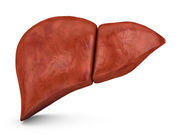Increased risk of liver cancer linked to hepatitis B DNA, surface antigen in a dose-response manner
WEDNESDAY, Nov. 1, 2017 (HealthDay News) — Elevated levels of hepatitis B virus (HBV) DNA and hepatitis B surface antigen (HBsAg) are associated with increased risks of liver cancer, according to a study published online Oct. 24 in the Journal of Gastroenterology and Hepatology.
Yang Yang, from the Shanghai Jiaotong University School of Medicine in China, and colleagues assessed the potential of HBsAg and viral load to stratify liver cancer risk. They performed a nested case-control study in 211 liver cancer cases and 221 controls who were sero-positive for HBsAg within two population-based cohorts in Shanghai.
The researchers found that the risk of liver cancer was positively associated with increasing levels of HBV DNA and HBsAg in dose-response manners. The adjusted odds ratios [ORs] increased from 2.11 (95 percent confidence interval [CI], 0.99 to 4.5) to 10.47 (95 percent CI, 5.06 to 21.68) for those with HBV DNA level of 2,000-19,999 IU/ml or ≥20,000 IU/ml compared with subjects with HBV DNA <2,000IU/ml. The adjusted ORs increased from 1.82 (95 percent CI, 0.9 to 3.68) to 2.21 (95 percent CI, 1.1 to 4.43) for those with HBsAg level at 100-999 IU/ml or ≥1,000 IU/ml versus subjects at a low level of HBsAg (0.05 to 99 IU/ml). Adjusted ORs were increased from 2.2 (95 percent CI, 1.07 to 4.49) for those with HBV DNA <2,000IU/ml and HBsAg ≥100IU/ml to 6.94 (95 percent CI, 3.39 to 14.23) for those with HBV DNA ≥2,000IU/ml and HBsAg <1,000IU/ml and 16.15 for those with HBV DNA ≥2,000IU/ml and HBsAg ≥1,000IU/ml versus those with HBV DNA <2,000 IU/ml and HBsAg <100IU/ml.
“Chronic HBsAg carriers may be suggested to simultaneously lower the viral load to <2,000 IU/ml and HBsAg level to <100 IU/ml to lower their liver cancer risk,” conclude the authors.
Copyright © 2017 HealthDay. All rights reserved.








